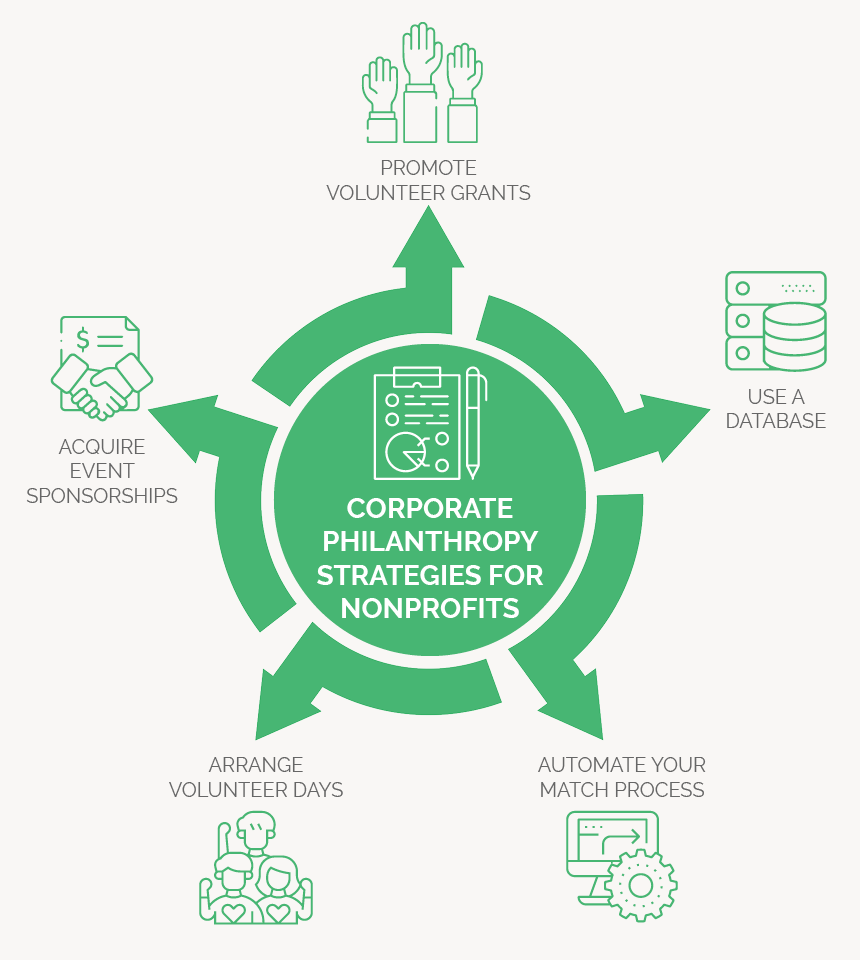The Function of Business Philanthropy in Fostering Sustainable Service Practices
Business philanthropy has become a pivotal approach for businesses aiming to integrate sustainability into their operations. By aligning business purposes with ecological and social efforts, organizations can cultivate healthier environments. This method not only improves company track record however likewise strengthens stakeholder connections. The real level of its effect on long-term business success remains to be checked out. What innovative practices are being adopted because of this?
Understanding Business Philanthropy and Its Significance
Business philanthropy serves as a vital device whereby organizations can add to societal wellness while boosting their own online reputations. This practice involves organizations designating sources, such as funds, time, or knowledge, to sustain neighborhood initiatives, philanthropic causes, or social programs. By taking part in humanitarian efforts, business can deal with pressing social concerns, such as education and learning, health and wellness treatment, and environmental problems, thereby playing a critical function in promoting positive adjustment.
Company philanthropy can enhance employee spirits and draw in skill, as individuals significantly look for to function for socially accountable companies. It can also reinforce customer loyalty, as consumers prefer brands that show a dedication to making a distinction. Inevitably, comprehending the importance of business philanthropy hinges on acknowledging its dual benefits: improving community well-being while simultaneously improving business integrity and credibility in the eyes of stakeholders. This placement of social responsibility with business rate of interests underscores its importance in today's company landscape.
The Connection Between Business Philanthropy and Sustainability
While several companies participate in philanthropy to improve their public photo, a much deeper connection exists between business philanthropy and sustainability. Company philanthropy frequently lines up with lasting techniques by sustaining initiatives that deal with ecological and social obstacles. When businesses invest in neighborhood jobs, renewable resource, or curricula, they add to a much healthier ecosystem and society. This dedication not only cultivates goodwill but likewise enhances stakeholder connections, boosting brand name commitment.

Situation Studies: Successful Company Philanthropy Initiatives
Many business have efficiently incorporated humanitarian initiatives right into their service techniques, demonstrating the substantial benefits of such commitments. For circumstances, Microsoft has launched countless programs, such as its AI for Planet initiative, which sustains environmental sustainability through technology. This approach not just aids preservation efforts however also boosts Microsoft's track record as a leader in corporate obligation.
Unilever's Lasting Living Plan stresses social and environmental impact, aligning its philanthropy you can try here with organization objectives. By moneying projects that enhance health and sanitation, Unilever strengthens its brand name while contributing to worldwide wellness.
Another remarkable instance is Patagonia, which vows 1% of sales to environmental reasons. This dedication resonates with consumers, cultivating commitment and driving sales.
These situation researches highlight that effective business philanthropy can generate economic returns while promoting sustainable methods, enhancing the concept that ethical company methods are beneficial for both society and base lines.
Structure Stronger Stakeholder Relationships Via Philanthropy
Philanthropy works as a vital device for firms looking for to strengthen their relationships with stakeholders, as it promotes depend on and shows a dedication to social duty. By participating in have a peek at this website philanthropic initiatives, businesses can get in touch with regional neighborhoods, improving their track record and motivating stakeholder commitment. This interaction commonly brings about significant interactions, producing a feeling of shared values in between the firm and its stakeholders.
Furthermore, humanitarian efforts can deal with details area demands, permitting companies to add favorably to societal challenges. This participation not just showcases a business's honest stance but additionally aids in drawing in and maintaining customers who focus on social duty.
In addition, employees typically feel extra determined and engaged when they see their organization proactively taking part in philanthropic tasks, causing a more effective work environment culture. Company philanthropy ends up being a strategic opportunity for building more powerful, much more resilient connections with varied stakeholder teams.
Measuring the Influence of Corporate Philanthropy on Organization Success
The connection in between corporate philanthropy and stakeholder interaction establishes the phase for assessing its influence on total company success. Organizations frequently gauge this effect through different metrics, consisting of brand online reputation, staff member contentment, and customer loyalty. Philanthropic campaigns can improve a business's photo, promoting trust among investors and consumers alike. Furthermore, involved employees tend to display higher morale and performance, straight correlating to improved service efficiency.
Quantitative analysis can likewise be utilized, with companies assessing monetary returns against philanthropic expenditures. Research study shows that firms with solid kind commitments commonly experience greater supply performance and decreased volatility. Additionally, qualitative analyses, such as stakeholder feedback, can provide understandings into community understandings and long-term relational benefits.
Eventually, measuring the influence of company philanthropy needs a diverse strategy, incorporating both measurable and qualitative information to assure a comprehensive understanding of its impact on organization success. corporate philanthropy.
Often Asked Concerns
Just How Can Local Business Take Part In Corporate Philanthropy Successfully?

What Prevail Misunderstandings Concerning Business Philanthropy?

Just How Does Company Philanthropy Impact Worker Spirits?
Company philanthropy positively influences worker spirits by promoting a feeling of function, boosting work complete satisfaction, and advertising commitment. Employees usually really feel a lot more involved and inspired when their business adds to social causes, producing an encouraging job setting.
What Are the Tax Obligation Benefits of Company Philanthropy for Businesses?
Business philanthropy provides considerable tax obligation advantages for organizations, including reductions on philanthropic payments and prospective decreases in taxed revenue. These incentives encourage business to participate in social efforts while at the same time improving their economic standing.
Exactly How Can Companies Choose Efficient Philanthropic Allies?
Business can choose effective kind partners by examining placement with their values, see post determining impact capacity, taking a look at monetary openness, and fostering solid communication. This tactical approach boosts collaboration and assurances shared benefits for both parties involved.
Corporate philanthropy serves as a necessary system with which organizations can add to social health while enhancing their very own reputations - corporate philanthropy. Inevitably, comprehending the value of company philanthropy lies in identifying its dual benefits: enriching neighborhood welfare while at the same time improving company credibility and reliability in the eyes of stakeholders. While several firms engage in philanthropy to boost their public picture, a much deeper link exists between business philanthropy and sustainability. The link between company philanthropy and stakeholder interaction sets the phase for examining its impact on total business success. Business philanthropy uses significant tax obligation advantages for companies, consisting of reductions on charitable payments and prospective reductions in taxable earnings